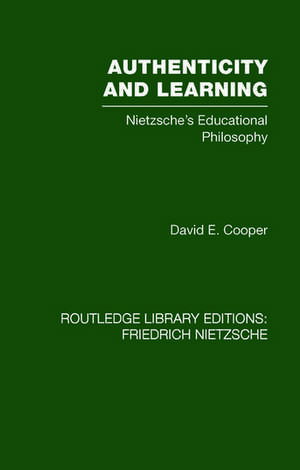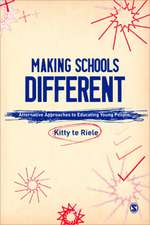Authenticity and Learning: Nietzsche's Educational Philosophy: Routledge Library Editions: Friedrich Nietzsche
Autor David Cooperen Limba Engleză Paperback – 21 feb 2012
For Nietzsche, the purpose of true education was to produce creative individuals who take responsibility for their lives, beliefs and values. His ideal was human authenticity. David E. Cooper sets Nietzsche's critique against the background of nineteenth-century German culture, yet is concerned at the same time to emphasize its bearing upon recent educational thought and policy.
| Toate formatele și edițiile | Preț | Express |
|---|---|---|
| Paperback (1) | 405.87 lei 6-8 săpt. | |
| Taylor & Francis – 21 feb 2012 | 405.87 lei 6-8 săpt. | |
| Hardback (1) | 1051.10 lei 6-8 săpt. | |
| Taylor & Francis – 21 dec 2009 | 1051.10 lei 6-8 săpt. |
Preț: 405.87 lei
Nou
Puncte Express: 609
Preț estimativ în valută:
77.69€ • 84.41$ • 65.30£
77.69€ • 84.41$ • 65.30£
Carte tipărită la comandă
Livrare economică 22 aprilie-06 mai
Preluare comenzi: 021 569.72.76
Specificații
ISBN-13: 9780415521567
ISBN-10: 0415521564
Pagini: 174
Dimensiuni: 138 x 216 x 9 mm
Greutate: 0.21 kg
Ediția:1
Editura: Taylor & Francis
Colecția Routledge
Seria Routledge Library Editions: Friedrich Nietzsche
Locul publicării:Oxford, United Kingdom
ISBN-10: 0415521564
Pagini: 174
Dimensiuni: 138 x 216 x 9 mm
Greutate: 0.21 kg
Ediția:1
Editura: Taylor & Francis
Colecția Routledge
Seria Routledge Library Editions: Friedrich Nietzsche
Locul publicării:Oxford, United Kingdom
Cuprins
1. Authenticity 2. 'Breadwinners' and 'Old Maids' 3. Nature and Technicism 4. Life and Liberal Education 5. Nietzsche's Philosophy of Truth 6. Genealogy, Values and the Teaching of Morality 7. The Justification of Society 8. The Higher Breeding of Man
Descriere
David E. Cooper elucidates Nietzsche's educational views in detail, in a form that will be of value to educationalists as well as philosophers. In this title, first published in 1983, he shows how these views relate to the rest of Nietzsche's work, and to modern European and Anglo-Saxon philosophical concerns.
For Nietzsche, the purpose of true education was to produce creative individuals who take responsibility for their lives, beliefs and values. His ideal was human authenticity. David E. Cooper sets Nietzsche's critique against the background of nineteenth-century German culture, yet is concerned at the same time to emphasize its bearing upon recent educational thought and policy.
For Nietzsche, the purpose of true education was to produce creative individuals who take responsibility for their lives, beliefs and values. His ideal was human authenticity. David E. Cooper sets Nietzsche's critique against the background of nineteenth-century German culture, yet is concerned at the same time to emphasize its bearing upon recent educational thought and policy.











